8A UNIT3学案
- 格式:doc
- 大小:133.00 KB
- 文档页数:7
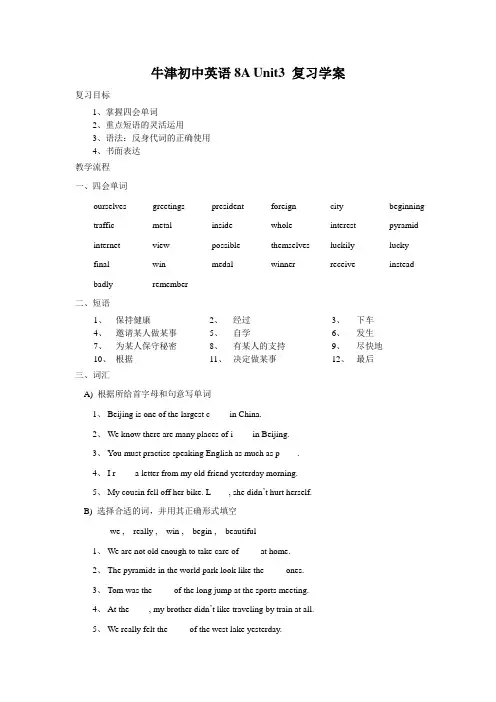
牛津初中英语8A Unit3 复习学案复习目标1、掌握四会单词2、重点短语的灵活运用3、语法:反身代词的正确使用4、书面表达教学流程一、四会单词ourselves greetings president foreign city beginning traffic metal inside whole interest pyramid internet view possible themselves luckily lucky final win medal winner receive instead badly remember二、短语1、保持健康2、经过3、下车4、邀请某人做某事5、自学6、发生7、为某人保守秘密8、有某人的支持9、尽快地10、根据11、决定做某事12、最后三、词汇A) 根据所给首字母和句意写单词1、Beijing is one of the largest c____ in China.2、We know there are many places of i____ in Beijing.3、You must practise speaking English as much as p____.4、I r____ a letter from my old friend yesterday morning.5、My cousin fell off her bike. L____, she didn’t hurt herself.B) 选择合适的词,并用其正确形式填空we , really , win , begin , beautiful1、We are not old enough to take care of ____ at home.2、The pyramids in the world park look like the ____ ones.3、Tom was the ____ of the long jump at the sports meeting.4、At the ____, my brother didn’t like traveling by train at all.5、We really felt the ____ of the west lake yesterday.C) 根据句子意思及汉语提示写出合适的单词1、During the rush hours, the ____(交通) is always very heavy.2、I’m thinking of ____(邀请) them to spend the summer with me in Italy.3、The ____(费用) of this trip is much cheaper than before.4、The school bus ____(到达) at our school at 7 am every day.5、Please ____(记住) to turn off the lights when you leave the office.四、语法根据句意,用合适的反身代词填空1、We shall never forget our visit to the Monkey Island we all enjoyed ____.2、Close friends should keep their secrets to ____.3、He hid ____ behind the door when he heard the footsteps.4、Help ____ to some bananas, boys and girls.5、I fell off my bike yesterday. Lucking, I didn’t hurt ____.五、根据内容和所给首字母提示,补全单词Yesterday morning, Linda went to the world park with kitty by c__1__. Though they felt s__2__ at the beginning of the t__3__, they e__4__ themselves later. They saw the m__5__ Eiffel Towner and p__6__ in Egypt, the Golden Gate. B__7__, and many o__8__ places of interest from all o__9__ the world. They thought the song and dance p__10__ was especially wonderful. In the world park, they took some p__11__ and Daniel put them on the internet for e__12__ to enjoy.1、________2、________3、________4、________5、________6、________7、________ 8、________ 9、________ 10、________ 11、_______ 12、________六、书面表达假如下周你和你的同学们要去黄山旅游,请根据表格提示,用英语写一篇短文,把下列内容告诉你的同学们,词数在70左右。
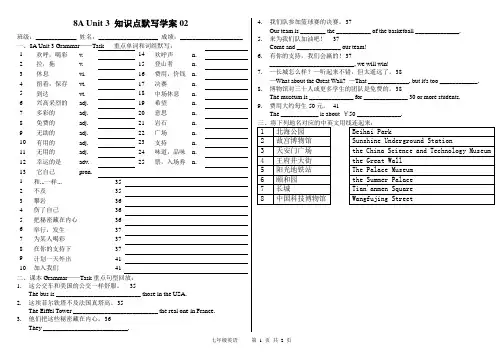
8A Unit 3 知识点默写学案02班级:_____________ 姓名:___________________ 成绩:____________________ 一、8A Unit 3 Grammar——Task 重点单词和词组默写:1欢呼,喝彩v.14欢呼声n.2拉,拖v.15登山者n.3休息vi.16费用,价钱n.4留着,保存vt.17决赛n.5到达vt.18中场休息n.6兴高采烈的adj.19希望n.7多彩的adj.20意思n.8免费的adj.21岩石n.9无助的adj.22广场n.10有用的adj.23支持n.11无用的adj.24味道,品味n.12幸运的是adv.25票,入场劵n.13它自己pron.1和...一样 (35)2不及353攀岩364伤了自己365把秘密藏在内心366举行,发生377为某人喝彩378在你的支持下379计划一天外出4110加入我们41二、课本Grammar——Task重点句型回放:1.这公交车和美国的公交一样舒服。
35The bus is ___________________________ those in the USA.2.这埃菲尔铁塔不及法国真塔高。
35The Eiffel Tower ___________________________ the real one in France.3.他们把这些秘密藏在内心。
36They ___________________________. 4.我们队参加篮球赛的决赛。
37Our team is ________ the ___________ of the basketball ______________.5.来为我们队加油吧!37Come and ______________ our team!6.有你的支持,我们会赢的!37___________________________, we will win!7.—长城怎么样?—听起来不错,但太遥远了。
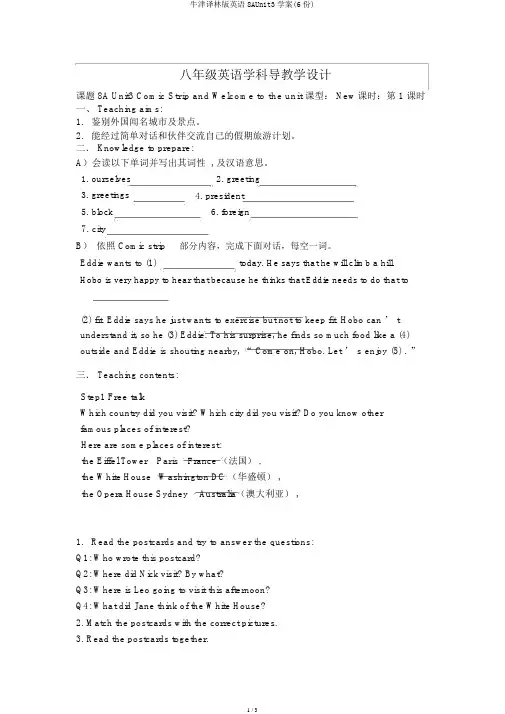
八年级英语学科导教学设计课题 8A Unit3 Comic Strip and Welcome to the unit课型: New 课时:第 1 课时一、 Teaching aims:1.鉴别外国闻名城市及景点。
2.能经过简单对话和伙伴交流自己的假期旅游计划。
二. Knowledge to prepare:A)会读以下单词并写出其词性 , 及汉语意思。
1. ourselves2. greeting3. greetings4. president5. block6. foreign7. cityB)依照 Comic strip部分内容,完成下面对话,每空一词。
Eddie wants to (1)today. He says that he will climb a hill.Hobo is very happy to hear that because he thinks that Eddie needs to do that to(2) fit. Eddie says he just wants to exercise but not to keep fit. Hobo can ’ t understand it, so he (3) Eddie. To his surprise, he finds so much food like a (4) outside and Eddie is shouting nearby, “ Come on, Hobo. Let ’ s enjoy (5) . ”三. Teaching contents:Step1 Free talkWhich country did you visit? Which city did you visit? Do you know otherfamous places of interest?Here are some places of interest:the Eiffel Tower Paris France (法国) ,the White House Washington DC (华盛顿) ,the Opera House Sydney Australia(澳大利亚) ,1.Read the postcards and try to answer the questions:Q1: Who wrote this postcard?Q2: Where did Nick visit? By what?Q3: Where is Leo going to visit this afternoon?Q4: What did Jane think of the White House?2.Match the postcards with the correct pictures.3.Read the postcards together.Step3Presentation: Part B on page 39Let ’opens the books and turn to page 39. Read Part B, the dialoguebetween Amy and Simon, and find out which country Simon would like to go.Q1: Which foreign country does Simon want to go?Q2: Which city?Q3: Which place does he want to visit?Step 4 Presentation: Comic Strip⒈Look at the picture and listen to the tape, then answer my questions.Q1: What is Eddie going to do?Q2: What exercise is Eddie going to do?Q3: Hobo thinks it’ s good. Why?Q4: Is Eddie going to climb a real hill? Then what hill?2.Read the dialogue together.3.Act out the dialogue.四. Knowledge carding连线: the Opera House Washington France the Eiffel Tower Sydney the USAthe White House Paris Australia五、 Compliance testing:达标测试一一、依照提示完成句子。
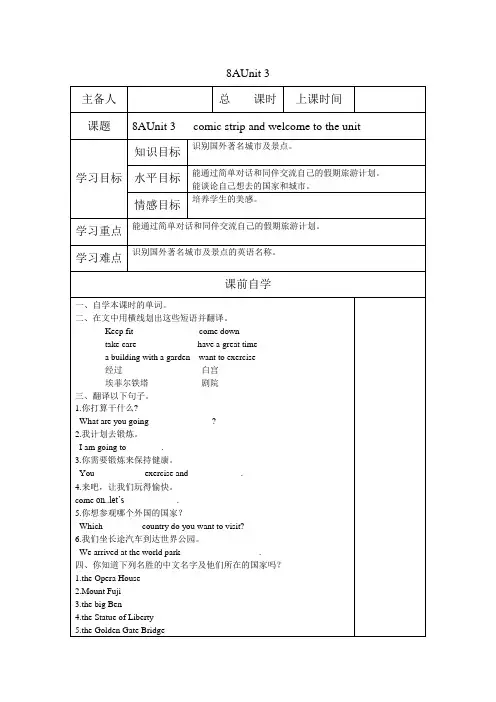
8AUnit 3导学案导学案导学案导学案导学案导学案导学案导学案导学案8A Unit 3参考答案导学案1一、1.boat past 2.coffee 3.president 4.with 5.foreign二、1. How did you arrive at the World Park?2.I took a boat trip under the famous Harbour Bridge and went past the Opera House.3.Did you have a good time when you went out?4.What were they doing when you went past?三、C B C B导学案2一、略。
二、1.School trip 2.coach 3.traffic 4.better 5.excited 6.got off 7.models8.interest 9.amazing三、1.Luckily 2.began 3.chose 4.to visit 5.to lend6.amazing7.taught8.yourself9.beauty 10.saw导学案3一、略二、1.they their 2. us 3.ourselves 4.yourself 5.my 6.yours 7.themselves8.our 9.hers 10. you your mine导学案4一、1.boring 2.invited 3.world 4.beauty 5.traffic二、1.What do you think of the trip?2.How far is it from the school to the park?3.He often goes to New York by plane.4.I go home on my foot after school every day.5. She sometimes rides a bike to school.三、1.take underground to World Park 2.over hundred places interest have no idea3.be careful too much traffic4.at the beginning of the meeting, sang5.on English, grades in导学案5一、1.but 2.or 3.and 4.or 5.and 6.but 7.but二、1. We can go to the Eiffel Tower or visit the pyramids first.2. The music was great but too loud.3. The Golden Gate Bridge was small and looked just like the one in America.4. Would you like some pears or grapes?5. spent on6.take an underground三、1.to go 2. to go 3.passing 4. not to cross5. play6. to buy7.don’t watch8. have四、1. you can go to Sanya or Guilin in the summer holiday.2. They are planning to go travelling tomorrow.3. Look! The children are playing hide-and-seek.4. Jack taught himself how to make a home page last year.导学案 6一、略二、1.help yourselves to 2.will hurt yourself 3.taught herself4.is pulling himself5.enjoyed ourselves6. by himself三、1.himself 2.myself 3.themselves 4. myself 5.themselves四、1.are preparing for 2.to stay at home, of going travelling, too much homework.3.to keep secret fo r each other4.Jiang Ming is ill now, and he can’t go to school.5.go swimming or fishing6.decided to7.planning for a really interesting trip.8.but he can’t solve the problem.导学案7一、1.cheerful 2.winners 3.final 4.supporters 5. receiving 6.cost7. sure 8.arrives 9.per 10.half-time二、1.more than two 2.cost him 3. which sportswoman to support 4.with many useful5.why not go/what about going三、go go go go going导学案8一、1.fact 2.opinion 3.fact 4.opinion 5.opinion二、1.preparing 2.invited 3.excited 4.beauty 5.amazing三、1.to keep fit 2.taught himself 3. take photos 4.is knocking at5. hide-and-seek四、1.ourselves 2.beginning 3.watched 4.are going to fly 5. unpopular导学案9一、略二、1.tries his best to 2.taught himself, home page 3.so many places of interest4. want to take, sunset5.climbs the rocks导学案10一、1. It is sunny and our city looks more beautiful.2. He invited me to the morning assembly but I am too busy to go.3. On Sunday you can go horse riding or listen to pop music at home.4. The little boy is very young but knows more things than the other children.5. My mother can do cooking for me at home or I can go to the restaurant for supper.二、1.stay 2.to do 3.to become to treat 4.to go 5.to pull三、1.yourselves 2.yourself 3.themselves 4.ourselves 5.himself6.myself7.itself8.myself9.himself四、略8A Unit4。
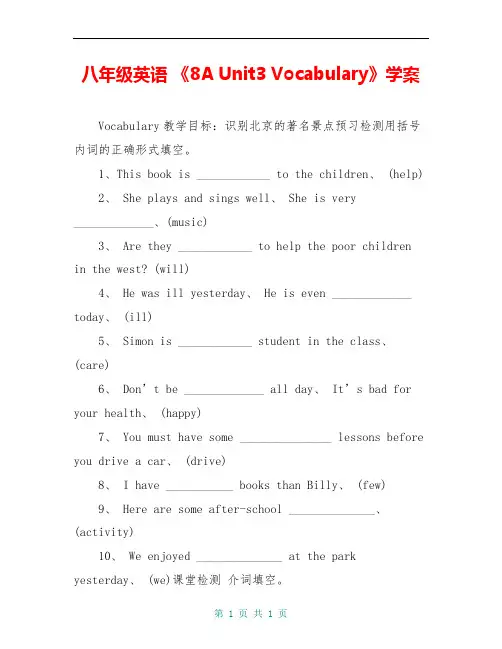
八年级英语《8A Unit3 Vocabulary》学案Vocabulary教学目标:识别北京的著名景点预习检测用括号内词的正确形式填空。
1、This book is ____________ to the children、 (help)2、 She plays and sings well、 She is very_____________、(music)3、 Are they ____________ to help the poor childrenin the west? (will)4、 He was ill yesterday、 He is even _____________ today、 (ill)5、 Simon is ____________ student in the class、(care)6、Don’t be _____________ all day、It’s bad for your health、 (happy)7、 You must have some _______________ lessons before you drive a car、 (drive)8、 I have ___________ books than Billy、 (few)9、 Here are some after-school ______________、(activity)10、 We enjoyed ______________ at the park yesterday、 (we)课堂检测介词填空。
1、The old man runs ___________ the lake every morning、2、 If you want to get there soon, you can go____________ underground、3、I’m sorry he’s_____________ now、4、 ___________ most students, he never comes to school late、5、 The students in our class are friendly ____________ each other、6、 If I have enough money, I will travel ______________ the world、7、Do you often think ___________ your best friend?8、 I have been in China ______________ a long time、课后检测单项选择:()1、—Where did you go in the summer holiday? Ivisited _______ in AustraliaA、 the White HouseB、the River SeineC、 the Golden Gate BridgeD、 the Harbour Bridge()2、________ the bus before your school and walk the rest of the way 、A、 Get onB、 Get alongC、 Get offD、 Get down ()3、When the policeman________ and knock at the door , the young man was still asleep、A、 arrivedB、 reachedC、 gotD、 started()4、There are many places of _________in Nanjing , and visiting them is_________A、 interesting; interestingB、 interesting ; interestC、 interest ; interestD、 interest ; interesting()5、There_______ always a lot of ________ on the roads of Nanjing at rush hour 、 It always takes much time to go back home 、A、 are ; trafficsB、 is ; trafficC、aren’t ; trafficD、isn’t ; traffic。
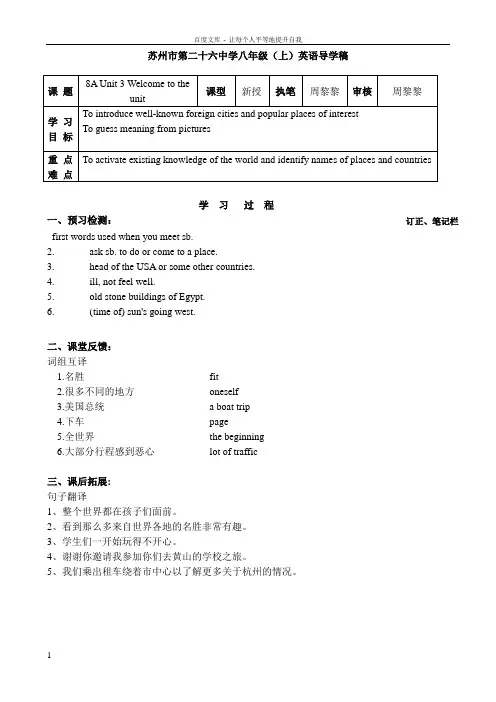
学 习 过 程一、预习检测:first words used when you meet sb.2. ______ ask sb. to do or come to a place.3. ______ head of the USA or some other countries.4. ______ ill, not feel well.5. ______ old stone buildings of Egypt.6. ______ (time of) sun's going west.二、课堂反馈:词组互译1.名胜 fit2.很多不同的地方 oneself3.美国总统 a boat trip4.下车 page5.全世界 the beginning6.大部分行程感到恶心 lot of traffic三、课后拓展:句子翻译1、整个世界都在孩子们面前。
2、看到那么多来自世界各地的名胜非常有趣。
3、学生们一开始玩得不开心。
4、谢谢你邀请我参加你们去黄山的学校之旅。
5、我们乘出租车绕着市中心以了解更多关于杭州的情况。
订正、笔记栏( )1. Please speak louder for us ___________you clearly.A. hearingB. hearC. listenD. to hear( )2. The White House is a beautiful building___ a big garden and many flowers.A. haveB. hasC. havingD. with( )3. It was a wonderful trip, ___________I liked it very much.A. butB. andC. orD. ∕( ) ___________a film tonight?A. don’t go to seeB. not go to seeC. not to seeD. don’t you going and seeing ( )5. It_________me 2 hours to get to my office this morning.A. takesB. tookC. spendD. costs二、课堂反馈:1、需要锻炼 6. feel sick2、美国总统7. on top of the Eiffel Tower3、玩得开心8. how to make a home page4、在会议开始时9. arrive at airport5.名胜10. the whole afternoon三、课后拓展:请翻译下列句子:(10)1.他们很有可能步行去长城。
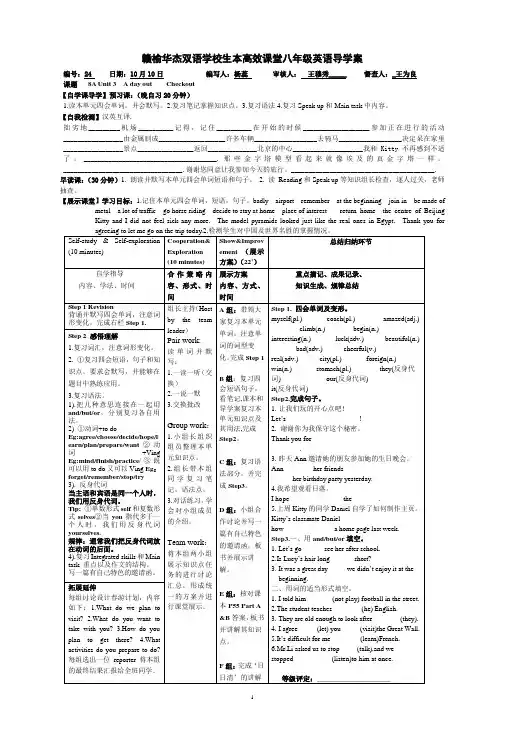
赣榆华杰双语学校生本高效课堂八年级英语导学案编号:24 日期:10月10日编写人:杨蕊审核人:王穆秀_____ 督查人:_王为良课题8A Unit 3 A day out Checkout【自学课导学】预习课:(晚自习20分钟)1.读本单元四会单词,并会默写。
2.复习笔记掌握知识点。
3.复习语法4.复习Speak up和Main task中内容。
【自我检测】汉英互译.拙劣地_________机场__________记得,记住__________在开始的时候___________________参加正在进行的活动_________________由金属制成___________________许多车辆__________________去骑马__________________决定呆在家里_________________景点________________返回______________北京的中心____________________我和Kitty不再感到不适了。
______________________________________.那些金字塔模型看起来就像埃及的真金字塔一样。
__________________________________.谢谢您同意让我参加今天的旅行。
_________________________________________. 早读课:(30分钟)1. 朗读并默写本单元四会单词短语和句子。
2. 读Reading和Speak up等知识组长检查,逐人过关,老师抽查。
【展示课堂】学习目标:1.记住本单元四会单词,短语,句子。
badly airport remember at the beginning join in be made of metal a lot of traffic go horse riding decide to stay at home place of interest return home the centre of Beijing Kitty and I did not feel sick any more. The model pyramids looked just like the real ones in Egypt. Thank you for agreeing to let me go on the trip today.2.检测学生对中国及世界名胜的掌握情况。
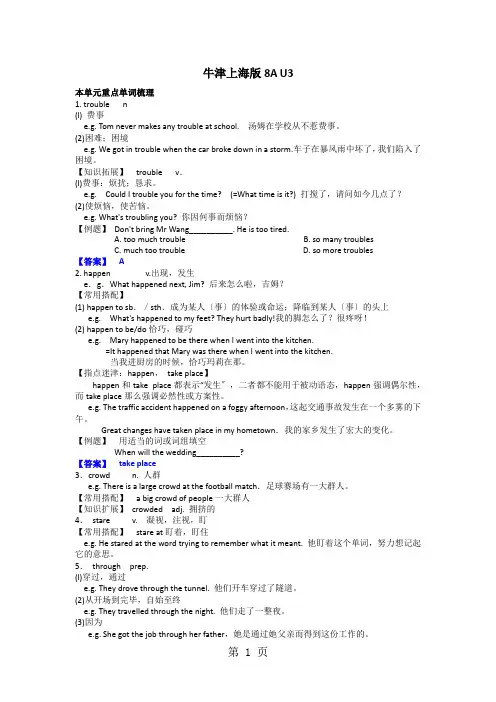
牛津上海版8A U3本单元重点单词梳理1. trouble n(l) 费事e.g. Tom never makes any trouble at school. 汤姆在学校从不惹费事。
(2)困难;困境e.g. We got in trouble when the car broke down in a storm.车子在暴风雨中坏了,我们陷入了困境。
【知识拓展】trouble v.(l)费事:烦扰;恳求。
e.g. Could I trouble you for the time? (=What time is it?) 打搅了,请问如今几点了?(2)使烦恼,使苦恼。
e.g. What's troubling you? 你因何事而烦恼?【例题】Don't bring Mr Wang__________. He is too tired.A. too much troubleB. so many troublesC. much too troubleD. so more troubles【答案】 A2. happen v.出现,发生e.g.What happened next, Jim? 后来怎么啦,吉姆?【常用搭配】(1) happen to sb./sth.成为某人〔事〕的体验或命运;降临到某人〔事〕的头上e.g. What's happened to my feet? They hurt badly!我的脚怎么了?很疼呀!(2) happen to be/do恰巧,碰巧e.g. Mary happened to be there when I went into the kitchen.=It happened that Mary was there when l went into the kitchen.当我进厨房的时候,恰巧玛莉在那。
【指点迷津:happen,take place】happen和take place都表示“发生〞,二者都不能用于被动语态,happen强调偶尔性,而take place那么强调必然性或方案性。
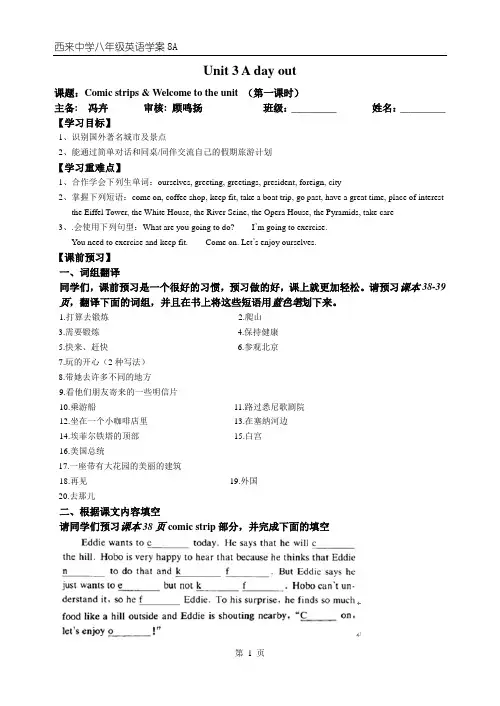
Unit 3 A day out课题:Comic strips & Welcome to the unit (第一课时)主备: 冯卉审核: 顾鸣扬班级:_________ 姓名:_________ 【学习目标】1、识别国外著名城市及景点2、能通过简单对话和同桌/同伴交流自己的假期旅游计划【学习重难点】1、合作学会下列生单词:ourselves, greeting, greetings, president, foreign, city2、掌握下列短语:come on, coffee shop, keep fit, take a boat trip, go past, have a great time, place of interestthe Eiffel Tower, the White House, the River Seine, the Opera House, the Pyramids, take care3、.会使用下列句型:What are you going to do? I’m going to exercise.You need to exercise and keep fit. Come on. Let’s enjoy ourselves.【课前预习】一、词组翻译同学们,课前预习是一个很好的习惯,预习做的好,课上就更加轻松。
请预习课本38-39页,翻译下面的词组,并且在书上将这些短语用蓝色笔划下来。
1.打算去锻炼__________________________2.爬山__________________________3.需要锻炼__________________________4.保持健康__________________________5.快来、赶快__________________________6.参观北京__________________________7.玩的开心(2种写法)______________________ ______________________8.带她去许多不同的地方_________________________9.看他们朋友寄来的一些明信片_____________________10.乘游船_________________________ 11.路过悉尼歌剧院____________________12.坐在一个小咖啡店里________________ 13.在塞纳河边________________________14.埃菲尔铁塔的顶部___________________ 15.白宫______________________________16.美国总统__________________________17.一座带有大花园的美丽的建筑_______________________18.再见______________________________ 19.外国____________________20.去那儿____________________________二、根据课文内容填空请同学们预习课本38页comic strip部分,并完成下面的填空三、将下列建筑和它所在的国家城市用直线连接起来:the White House Francisco Chinathe Great Wall Paris Francethe Big Ben London Englandthe Harbour Bridge Beijing Americathe Golden Gate Bridge Sydney Australiathe Eiffel Tower Washington【课堂训练】选择题:(100分,每题10分)同学们,一节课结束了,所有内容你们都掌握了吗?我们来检测下,看看自己得多少分?()10. There _______ an English party next Saturday.A. is going to haveB. will beC. hadD. will be得分:________ 自我评价:______【课后巩固】【能力拓展】一、改错:二、改写句子:三、完成句子:【家庭作业】1.完成自主检测相对练习 2. 完成学案课后巩固和能力拓展部分。
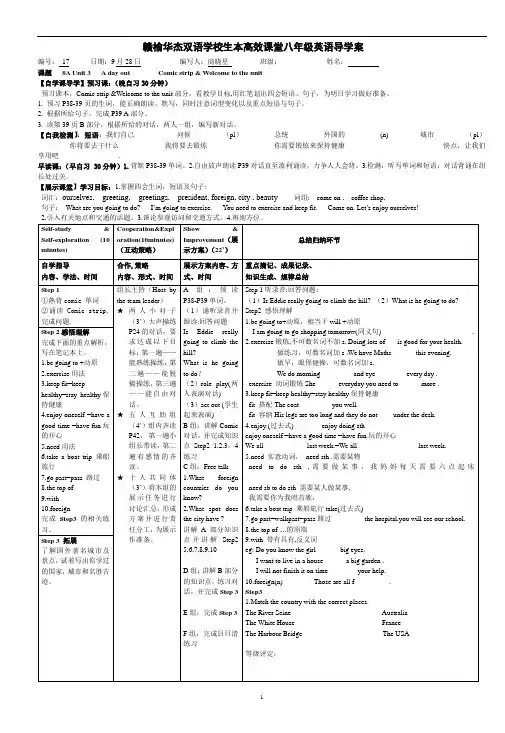
赣榆华杰双语学校生本高效课堂八年级英语导学案编号:17 日期:9月28日编写人:商晓星班级:_________ 姓名:_________课题8A Unit 3 A day out Comic strip & Welcome to the unit【自学课导学】预习课:(晚自习30分钟)预习课本,Comic strip &Welcome to the unit部分,看教学目标,用红笔划出四会短语、句子,为明日学习做好准备。
1. 预习P38-39页的生词,能正确朗读、默写,同时注意词型变化以及重点短语与句子。
2. 根据所给句子,完成P39 A部分。
3. 读第39页B部分,根据所给的对话,两人一组,编写新对话。
【自我检测】:短语:我们自己____________问候_________(pl)_________总统__________外国的__________(n)_________城市_________(pl)_________你将要去干什么_____________我将要去锻炼___________________你需要锻炼来保持健康____________________________快点,让我们享用吧_________________.早读课:(早自习 30分钟)1.背默P38-39单词。
2.自由放声朗读P39对话直至流利诵读,力争人人会背。
3.检测:听写单词和短语;对话背诵在组长处过关。
【展示课堂】学习目标:1.掌握四会生词,短语及句子:词汇:ourselves, greeting, greetings, president, foreign, city , beauty 词组: come on , coffee shop,句子:What are you going to do? I’m going to exercise. You need to exercise and keep fit. Come on. Let’s enjoy ourselves!【反馈课导学】“日日清”达标训练检测题书写等第达成等第__________________________【基础题】一. 根据汉语提示或所给词的适当形式填空。
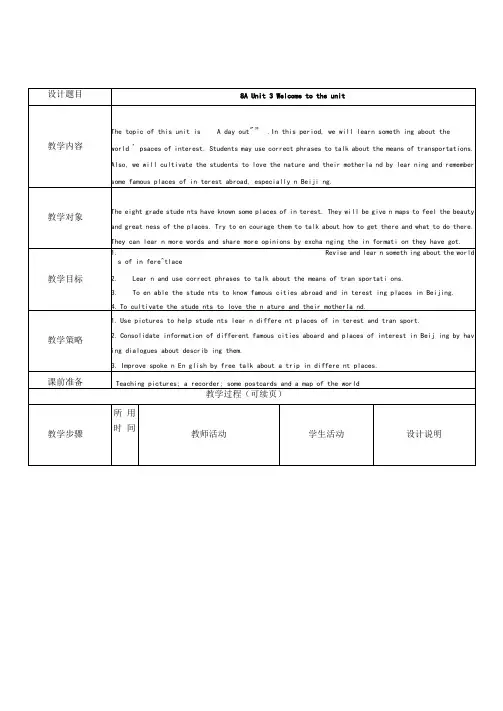
Step 1. PreviewStep2. Warming up2min Show Preview tasks for studentsAsk them to show it.Learn the new wordson P126.theyPrese nting famousthey places of in terestthey 'veever visitedand share theAsk Students what places have beento and tell what think of theseplaces.travelli ng experie nces Prepare for the less on.Step 3. Prese ntati on(Comic strips)3min7minwith the class.1.To in troduce the Comicstrip 1. Share their opinions by the question ‘ Ifyou are free, with the class.what are you going to do? '2.Ask: Is Eddie really going to ZWatch the caKoonsclimb the hill? What is he going to do?and liste n carefully forthe specificin formati on.Step4. PracticeStep5. In troduct ion2min 3. Ask questi ons.3.Go through the picturesand the con versati onbetweenEddie and Hobo.4.Get some pairs of students to read it outfirst.4..Read thecon versatio n aloudafter the recorder.5.Then act it out in roles before 5. Act it outthe class.Prese nt the exercises.1. Prese nt a map of the world and encourage the stude nts to say the n ames.Warm their brains and let themknow we will learn somethingabout places of in terest.Use pictures to arouse the interest of lear ning.Lead in the dialogue.Train the skills listening.ofin theEn courage stude nts totake the chanee toRead and fillbla nks.share the n ames of theforeig n coun tries inEnglish, such as the USA,En gla nd.Australia; France etc.practice spoke n En glishpractice speak ing skills.Try to let them remember thedialogue.Step 5Activities12 minsthe beginning1. Why did Linda go toAnswer the questionS know the mainthe World Park?Let the stude ntsand learn some ideas of the text.- at the school gate1.When did they meet?2.Who did Kitty andLinda meet?reading skills1 on the coach1.How long does it take?2.What does Lindathink of the trip?3.What is on the cityroads?4.Where were theythen?5.How did Kitty andLinda feel for most of the trip? at theWorld Park1. What was the weatherAnd also train the student how to read differe ntpassages, e.g., they learn fast reading and detailreadi ng.See if the students教学过程(可续页)Stepl: Lead inStep2.Prese ntati on Step3 practice. Step 4 SummaryStep5Prese ntati on Step6 practiceStep 7 Summary 2 min2 min12mi n2 min2min12 min3minT: Hi , boys and girls, today we are goingto revise the reading.Look at the blackboard, practice: practiceit orally, then do some exercises.Review reflexive pronouns.Get the students to use reflexive pronounsto practice, the n do some exercises.Practice1.Where did Lin da go withKitty ' class?2.W hy did she feel bored at thebegi nning?3.W hat did Linda think o' the songand dance shows?It looked as great as the rea one.They 're not as big as the realone.This pen is as long as tha one.His bag is as heavy as hers. Jimis as tall as Mike.This pen is not as long a that one.His bag is not as heavy a hers.Practice itStude nts did not enjoy themselvesat thebeg inning.Practice:I fell over and hurt myself. Theirbaby daughter car feed herself.My cat cleans itself every dayfLear n the rulesLead in the newless on.Lear n ancpracticeSum upLear n andpracticeSum up3 are making a pla n for it. places, what to )do/see more familiar with Step3: Prese ntati on and the cost of the trip. the in formatio nabout the pla n for aday out.Ask stude nts to review Students go over then formatio n about Kitty and letter again and answei Make stude nts; Step 4: Review Dani el ' trip and the n retell it some questi ons. have the idea of3accord ing to the letter. how to write a pla nfor a trip and tellmore details..Suppose you are going Gather theAsk students to think about to have a trip. What'in formatio n we Step 5: 2 details about a day out. your pla n for it ? needsFurther discussi oncomplete the passage 3 Review the main Step 6: Let stude nts read the pla n in according to the plan points of this un it. Read and exercises Part A carefully by themselves and give.say it out.5Step 7: Ask and .Review the Know some an swer Try to ask and answer in pairs information in the book detail in formati onabout Kitty and Daniel ' plan.. and try to think out more about the trip.A4about the trip.Step 8: Read aga in Collect more and retell Let stude nts read the letter in formatio n aboutcarefully, find out what the letter is Think about what the the later writi ng.about and try learn how to write plan is about and try toabout a day out. summarize. Know the contents,5 in the letter ancgive a directi on ofthe students 6wnPrepare notes aboul writ in g.Step 9: notes P repare5Ask stude nts to write a letter their day out., using the informati on collectedbefore. They can refer to theuseful expressi ons on Con solidatePage40. students ' writingability by writingnotes alone. At theWrite alone with the same time, it carAsk stude nts to write about a day certain topic, especially develop stude ntsout with the give n in formati on. learn from the model differe nt abilities. Step 10: Think and passage and paywrite 12 atte ntio n to your Lear n how togrammar mistakes. write an excellentwriting and how tocorrect the Finish writing the article and check Finish the writing anc mistakes bythe mistakes alone correct the mistakes. yourselves.Step Homework 11:1Con solidatewhat the studentslearned in thisless on.。
赣榆华杰双语学校生本高效课堂八年级英语教案编号:23 日期:10月15日班级:__________姓名:__________【自学检测】课题8A Unit 3 A day out Main task【自学课导学】预习课:(晚自习30分钟)预习课本,Main task 部分,看学习目标. 1.预习P53-54页,用笔划出四会词组和句子,为明日做好准备。
2.读P53页A部分内容,完成C部分内容。
北京的中心在每个地方返回家计划一天外出使它成为一个真正有趣的一天它将花费大约30分钟我们希望你能加入我们列出名胜古迹的清单计算演算出换乘公交车乘公交车一路去某地尽快早读课:(早自习 30分钟)目标:1. 背诵单词,短语,句子。
2 .自由放声朗读P54短文,并归纳每段的大意。
3.检测:听写词【展示课堂】学习目标:1. 掌握四会短语及句子:词组:the centre of Beijing at each place return home plan a day out make it really a fun day It will take about thirty minutes. We hope you can join us . make a list of places of interest work out change to the bus take the bus all the way to as soon as possible 2.选择、组织并呈现信息。
3.识别关键信息并将其归类,计划一次外出郊游。
4. 写信邀请朋友外出郊游。
【反馈课导学】“日日清”达标训练检测题书写等第达成等第_______________________【基础题】一、根据句意及首字母或汉语提示用适当形式填空1. Make a l________ of places of interest for you to go to.2. We are p__________ a day out to show you around our city.3.The cost of the trip is¥10 P_______person4. Mike and his friend worked out the c____________.5. I ___________(返还) the book to the library yesterday .6.This ticket for the football match__________ (cost)about¥10.【能力题】二、按要求完成句子1. 我们打算使学校成为对大家来说真正有用的地方。
8A英语导学案班级_____________ 姓名_____________课题:Unit3 A day out Vocabulary 课型:新授课主备:钱小兰审核:初二英语备课组使用时间:【明确目标】1知识目标:a理解新词:beauty、viewb掌握本课的新词组:2、能力目标:a识别北京的著名景点b学会使用适当的词语谈论交通方式3、情感目标:通过对北京景点和交通方式的认识,培养学生对于首都的热爱。
【前置学习认真预习、理解课本并划出下列词组,然后给出中文意思:Tian’an men Square______________ travel by underground___________Laoshe Tea House______________ the Summer Palace______________the Palace Museum_______________Wangfujing Street________________【合作探究】1、预习情况交流。
2、试说马鞍山的旅游景点和交通情况。
3、读出课本P44的北京6个景点词组,并讨论他们的交通和特色。
知识链接1.take a boat trip == have a boat trip, go on a boat trip1).Next Sunday, I’ll to Taihu lake . (乘船)2).Last year , he there.2. I went past th Opera House past经过,介词;易错词:passed 动词过去式1).The little boy happily walked the shop and went home.2).On the basketball court , they quickly the ball.3. a building with a beautiful garden 一座带有美丽花园的房子。
译林版8A Unit 3 A day out同步学案与练习第1课时Comic strip&Welcome to the unit预习目标1.根据单词表,预习课本第30~31页的单词,能根据音标正确拼读这些单词。
2.听课本第30页Comic strip部分的录音,能正确地模仿录音中的语音语调。
3.找出课本第30~31页新出现的短语和重点句型,查一查它们的意思。
4.了解如何与同伴交流自己假期的旅游计划。
预学热身◆通过预习,了解本课时的单词、短语、句型(英汉互译)。
1.ourselves pron._______2.Australia n._______3.coffee n._______4.top n. _______5.president n._______6.wide adj. _______7.steel n._______ 8.ton n._______9. climb a hill 10. come on_______11.enjoy oneself _______ 12.______________保持健康13._______一个真的14. ______________ 乘船旅行15._______过得愉快16.______________今天下午17._______美国总统18. ______________再见19. Well, this hill isn't as high as a real one! ____________________________20. - How wide is the bridge? - It's 90 feet wide. _____________________21. The bridge is made of steel, isn't it? ____________________________◆自主探究,请带着下面这些问题阅读教材。
Unit 1 Topic 3 Section A教学目标1.学习新单词和短语。
foreign, have fun, lots of, be ready for, relay race, maybe, make friends, perhaps2.学习 will 构成的一般将来时(1)I think I’ll have lots of fun.(2)I’ll do my best. I won’t lose.(3)Maybe I’ll make many friends during the sports meet.(4)I’ll join in the teachers’ relay race.3. 谈论学校运动会一复习 be going to do结构翻译下列句子1.I'm going to play soccer this Sunday.2.There is going to be a school sports meet next weekend.3.你长大后想做什么?4.我想成为一名舞蹈演员。
5.你打算参加跳高和跳远比赛吗?二本课知识I. 翻译下列词组1. boy's 800-meter-race2. I'll be in....3.foreign friend4.have lots of fun5. Teachers' relay race6.make many friends7. a pair of running shoes 8. be ready forII. 知识点击1. I will take part in the school sports meet. 译用will表示一般将来时,意为“将要....”。
由“will+动词原形”构成。
人称代词与will连用时Will可缩略为 'll。
如:He'll bring you some presents.2. I'll be in the high jump and the long jump.译be in+活动,相当于take part in.3.I 'm sure our school sports meet will be exciting. 译be sure+(that)从句确信.....我确信你下次能做的更好exciting adj. "令人激动的,令人兴奋的"。
课题:8A Unit 3 A day outWelcome to the Unit【教学目标】1. 掌握下列单词、词组和句子,并能熟练朗读和使用。
单词:ourselves, Australia, coffee, top, president, wide, ton, steel, helpless, useful, cheer, hope, meaning, taste, ticket, keep, useless, cheerful, colourful词组:come on, enjoy oneself, take a boat trip, go past, have a great time, take care, coffee shop, the song and dance show, from different countries, feel cheerful 句型:What are you going to do, Eddie?I’m going to exercise.You need to exercise and keep fit.2. 识别国外著名城市和景点,学会用英语与同伴谈论这些景点。
3. 流利的朗读对话并表演,注意正确的语音语调。
【教学重难点】1.能够识别国外名著城市的景点并能正确朗读。
2.学会用英语和同伴谈论各国景点。
【教学过程】Step1. Free talkDo you like traveling?Show students some famous places of interest in different countries.Step2. PresentationDiscuss the foreign countries and famous places of interest.Show some places of interest in the world and teach their names.Finish Part A on Page31 and checkout the answers.Step3. Practice I1. Learn the postcards one by one. Answer some questions about them.2. Make a dialogue.3. Ask Ss to talk about where do they want to go.4. Learn Part B5. Read and answer the questions.Step5. Practice II1. Listen to the tape and answer two questions.2. Read the Comic Strip then fill in the blankets.3. Do some exercises.Step6. Study skills1. Read and practice.2. Help the students to work out the rule.Step7. HomeworkFinish off the exercises.Reading I【教学目标】1. 初步掌握下列重点单词、短语和句子并能熟练朗读和使用。
八年级英语上册Unit 3 A day out Check out。
二.用or, and 或but 合并下列句子。
1. It is sunny . Our city looks more beautiful .2. He invited me to the moring assembly . I am too busy to go .3. On Sunday you can go horse riding . You can listen to PoP music at home .4. The little boy is very young . He knows more things than the other children .My mother can do cooking for me at home. I can go to the restaurant for supper .三、用所给动词的适当形式填空。
1.My mother agreed me___________(go) to the the party in the park.2.I hope __________(have) a toy plane at Christmas.3.He always wants ____________(be) the best students in class.4.Linda planned _____________(travel)by bike.5.I’m alone here.Will you choose _____________(stay) and play with me?6.He tells funny jokes and makes me __________(laugh).课堂达标检测一.单词变脸。
Myself(复数)________ begin(名词)__________coach(复数)_________ interesting (名词)______luckily (形容词)_____ beautiful(名词)______climb(名词)________ luck(副词)__________cheerful(动词)_______ bad(副词)____________二.用所给动词的适当形式填空.Mother let Millie (stay) at home herself , because she is on duty today .You are old enough to decide what (do )I hope (become) a doctor (treat) all the patients .He plans (go) on a school trip together with his classmates. 5. Look! Simon is trying (pull) himself up on the rocks. 三.汉译英。
1. Jack总是尽力帮助别人。
Jack always ____ ____ _____ ____help others.2.他自学怎样制作主页。
He ____ ______ how to make a .3.看到如此多的来自全世界的名胜真有趣。
It was interesting to see from all over the world.4.你想拍一些落日的照片吗?Do you ______ _____ _____ some photos of the________?5.她经常和他们一起去攀岩。
She often ____ ____ ______ with them.八年级英语上册Unit 3 A day out Comic strip and welcome to the unit 精品学案牛津译林版二、在文中用横线划出这些短语并翻译。
Keep fit come downtake care have a great timea building with a garden want to exercise经过白宫埃菲尔铁塔剧院三、翻译以下句子。
1.你打算干什么?What are you going ____ _______?2.我计划去锻炼。
I am going to________.3.你需要锻炼来保持健康。
You _____ ____exercise and _____ ______.4.来吧,让我们玩得愉快。
come on..let’s _____ ______.5.你想参观哪个外国的国家?Which ________ country do you want to visit?6.我们坐长途汽车到达世界公园。
We arrived at the world park ______ _________ .一、根据首字母填空。
1.I took a b______ trip under the famous Harbour Bridge and went p_____ the Opora House.2.We are sitting in a little c_________ shop by the river Seine.3.The p________ of the USA lives there.4.It is a beautiful building w______ a big garden and many trees.5.Which f________ country do you want to visit?二.根据提示,完成句子.1.We ______ _____ ______ _____ (乘船旅行)on the Y angze River last summer.2.It is diffcult for me to reach ______ _______ ________(……的顶部) the mountain.3.It is a beautiful school _____ _____ _______ ________ (有一个大的图书馆).4._______ ________ (来吧)! Let`s play with each other.5.When the ship _____ _______(经过) the Opera House,we felt very excited.三、句型转换。
1.we arrived at the World park by coach.(对划线部分提问)2.the famous Harbor Bridge,took a boat trip,I,and,past the Opera House,under,went.(连词成句)3.Did you enjoy yourselves when you went out?(改成同义句)4.when I passed by,they were sitting in a little coffee shop.(对划线部分提问)四.选择。
1________.is live in the White House.A. BushB. WashiontonC. Orbama2.The Effiel Tower and River Seine are both in __________.A.LondonB. ParisC.New York3.The Effiel Tower is _______ metres high.A.34B.134C.3244.If you go to Australia, don’t forget to go to see the ________.A.Big BenB.Opera HouseC.River Seine.导学案 1一、1.boat past 2.coffee 3.president 4.with 5.foreign二、1. How did you arrive at the World Park?2.I took a boat trip under the famous Harbour Bridge and went past the Opera House.3.Did you have a good time when you went out?4.What were they doing when you went past?三、C B C B八年级英语上册Unit 3 A day out Grammar 2精品学案牛津译林版二、写出这些含有反身代词的短语。
1.亲自2.伤了自己3.独自4.玩得开心5.自学6.自言自语7.请随便吃8.把秘密藏在心里9.照顾自己10.迷路三、尝试用适当的反身代词填空。
1.Can you and Mary look after _____________?2.Mary hide ________ behind a wall.3.We need help because we can’t do it by_________.4.The boy looked at _________in the mirror.5.I learn English all by ______________.课堂达标检测一词组翻译1. 玩得痛快2. 捉迷藏3. 把自己拉上去4. 靠自己,独自5. 弄伤自己6. 拍照7. 随便吃…… 8. 在车的前部9. 攀岩10. 自学二用所给动的适当形式填空。
le decided _________(stay) in the school that day.2.The work was not difficult,and we choose _________(do) it in the morning.3.Look!The children ______(play) hide-and-seek in the garden.4.If it _______ (not rain) tomorrow,I ________(go) climbing.5.He was so surprised ________ (hear) the suriprising news.三根据句意,用适当的反身代词完成句子。
1. Kate, you’d better ask the teacher __________ .2. The work is not hard, I can finish it by__________.3. Her parents teach _____________ Japanese every day.4. I can look after_________ now.5. Luckily, The girls didn’t hurt ____________.四句子翻译。